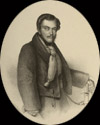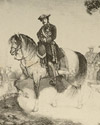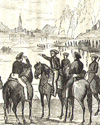19th Century´s militar history in the Basque Country
Infante Don Sebastian. (1811-1875)
 Sebastián Gabriel of Bourbon and Braganza was born in Brazil in 1811. His mother, the Princess of Beira became a widow two years later. He received an extensive and varied education compared to the usual schooling of the Spanish Court, at which he arrived in the company of his mother and aunt, the first wife of infante D. Carlos.
Sebastián Gabriel of Bourbon and Braganza was born in Brazil in 1811. His mother, the Princess of Beira became a widow two years later. He received an extensive and varied education compared to the usual schooling of the Spanish Court, at which he arrived in the company of his mother and aunt, the first wife of infante D. Carlos.
His cultural curiosity and concerns led him to experiment in a range of disciplines, such as writing, painting and lithography. He built up a magnificent library, a large physics facility, and an extensive collection of paintings. He even published two newspapers on his own press, called El Lagarto and La Mariposa..
He was fluent in five languages, created a circle of intellectuals, and acted as sponsor for artists in Madrid.
 On the death of Ferdinand VII, he emigrated to Rome and joined the troops of Don Carlos towards the end of 1835. He took part in the second siege of Bilbao and, after the defeat at Luchana, the Pretender appointed him general-in-chief of the Northern Army. He fought against the Liberal generals Espartero and Sarsfield.
On the death of Ferdinand VII, he emigrated to Rome and joined the troops of Don Carlos towards the end of 1835. He took part in the second siege of Bilbao and, after the defeat at Luchana, the Pretender appointed him general-in-chief of the Northern Army. He fought against the Liberal generals Espartero and Sarsfield.
He reorganised the army and made a decisive contribution to the victory of Oriamendi where, after a gruelling march for his troops, he arrived in time to destroy the British Auxiliary Legion near San Sebastián.
 In May of the same year, Don Carlos granted him the military command of the Royal Expedition. He travelled around Aragón, the Maestrazgo and Castile, before arriving at the gates of Madrid. The failure of this expedition, albeit due more to political than military reasons and hence the responsibility of the Infante, led to his removal from the command of the Carlist army.
In May of the same year, Don Carlos granted him the military command of the Royal Expedition. He travelled around Aragón, the Maestrazgo and Castile, before arriving at the gates of Madrid. The failure of this expedition, albeit due more to political than military reasons and hence the responsibility of the Infante, led to his removal from the command of the Carlist army.
He remained at the Pretender's side until he left the Peninsula, following the Abrazo de Bergara. He settled at the Court of Naples until, twenty years later, Isabel II granted an amnesty to the Carlists and he returned to Spain.

